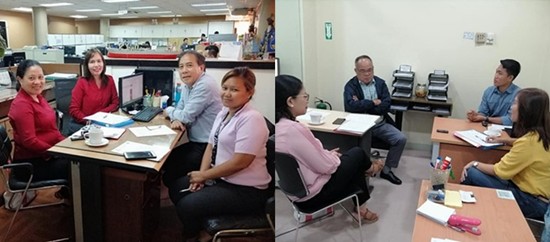
NMP
maritime research personnel conducting data gathering
activities. |
NMP addresses
industry needs through relevant researches
By
National Maritime
Polytechnic
October 29, 2019
TACLOBAN CITY –
Pursuing its second mandate as a research institution of the
government on maritime matters, the National Maritime Polytechnic (NMP)
undertakes researches and studies that generate data and information
integral in a dynamic maritime industry.
With its radar focused on
maritime manpower development consistent with the workforce
framework of its mother agency, the Department of Labor and
Employment (DOLE), the NMP embarks on research initiatives and
advocacy that relate to the Philippines as the world’s largest
provider of competent seafarers.
This year, NMP is
undertaking four (4) researches as provided under the 2019 General
Appropriations Act (GAA) and targeted to be completed by 31 December
2019, to wit:
Effects of Autonomous Shipping in the Philippine Maritime Industry
The study aims to identify
and discuss how manning and shipping companies respond to this new
development in shipping, the autonomous ship technology, and what
interventions they will take to address the challenge to produce
qualified seafarers for vessels of the future.
More specifically, the
study aims to: (a) determine the possible effects of autonomous ship
technology to the Philippines as a major crew provider to oceangoing
vessels; (b) identify career options or alternative profession where
displaced seafarers could possibly apply when full autonomous
shipping is implemented; (c) document required competencies and
skills and the interventions or measures being done by manning and
shipping companies, as employer of the seafarers, in the light of
the impending full implementation of autonomous ship technology; and
(d) recommend strategies and approaches to address identified skills
gaps / training needs in response to the full implementation of
autonomous ship.
The Capacity of the Philippine Maritime Industry to Produce
Officers-In-Charge (OIC) per Requirements of the 1978 STCW as
Amended: Focus on cadet Onboard Training
The research undertaking
aims to determine the capacity of the Philippine maritime industry
to produce Officers-In-Charge in accordance with the requirements of
the 1978 STCW, as amended, with focus on the Onboard Training
Program as a mandatory requirement to obtain a degree in Bachelor of
Science in Marine Transportation (BSMT) and Bachelor of Science in
Marine Engineering (BSMarE) and a Certificate of Competency (COC)
for officers.
The specific objectives of
the study are: (a) to determine the outputs of individual Maritime
Higher Education Institutions (MHEIs) in terms of graduates versus
enrollees in BSMT and BSMarE, including the deployment rate of
cadets under the Onboard Training Program; (b) determine the number
of Philippine domestic ships, Philippine-flagged ships engaged in
international voyage available for training berths and Philippine
manning agencies that accommodate cadets on behalf of their
international shipowners, as well as their policies on accommodating
cadets; (c) identify issues and concerns in the implementation of
the Onboard Training Program from the viewpoints of the
stakeholders; and (d) recommend a plan of action to identified
issues and concerns.
Employment Acceptability of Women in Philippine Domestic Shipping
The study intends to
identify and analyze the gaps in the recruitment and selection
process of domestic shipping companies when it comes to female
seafarer employment. Primarily, the study aims to: (a) determine the
level of domestic shipping companies in employing women; (b) gather
information on the current policies and practices in the recruitment
and selection process of domestic shipping companies with regards to
the employment of seafarers; (c) identify the challenges faced by
women when applying for shipboard employment in domestic vessels;
and (d) recommend a plan of action for the improvement of female
recruitment into domestic shipboard jobs.
Profile of Philippine Maritime Employment Laws
The study is designed to
provide the Filipino seafarers with a supplemental tool in the
understanding of the employment laws, related cases or
jurisprudence, and the arbitration process related to their
employment.
The research is grounded
on the following objectives: (a) identify the Philippine employment
laws and decided cases in relation to the employment of Filipino
seafarers; (b) present the arbitration process in the Philippines
regarding seafarers’ labor cases; (c) identify the cases lodged in
the Philippine arbitration routes; and (d) provide guidelines on
actions to be taken by seafarers confronted with issues related to
seafaring.
NMP, being the only
government maritime research center in the country, responds to
dynamic characteristics of the maritime industry and the consequent
demand for timely, accurate, and relevant data as basis for program
and policy development.
Findings of these
researches will be disseminated next year to the industry
stakeholders from the government, maritime education and training
(MET) institutions, maritime associations, seafarers’ organizations,
shipping companies and manning agencies. Recommendations from the
researches may serve as valuable inputs to policy making and program
development that impact on the Filipino seafarers as a special
workforce of the country.
Those interested in NMP
research undertakings may visit the NMP website (www.nmp.gov.ph) and
access the e-Research Information System Portal which is designed to
disseminate NMP completed researches, present the Research Agenda
and engage the industry stakeholders to collaborate in the research
activities.
Aside from its research
function, the NMP continues to upgrade its facilities and provide
maritime trainings required pursuant to the Standards of Training,
Certification, and Watch keeping for Seafarers (STCW) Convention as
amended in 2010 including value-adding courses towards improving the
qualifications of Filipino seafarers for their employment
acceptability and enhanced competitiveness.
DOLE holds
groundbreaking ceremony for future North Leyte Field Office
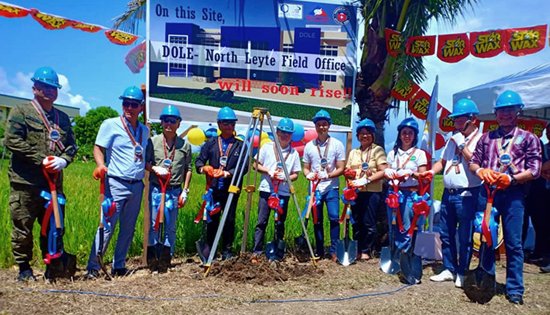
By
NORMA RAE S. COSTIMIANO
October 28, 2019
TACLOBAN CITY – A
groundbreaking ceremony was held by the Department of Labor and
Employment Regional Office VIII for its future North Leyte Field
Office last October 22, 2019 at Government Center, Candahug, Palo,
Leyte.
The simple ceremony was
witnessed by the different partners and stakeholders of DOLE RO VIII
with Executive Director Noel C. Binag of Occupational Safety and
Health Center as the keynote speaker.
Regional Director Yahya A.
Centi in his opening remarks grabbed the opportunity to extend his
heartfelt gratitude to the Province of Leyte headed by Governor
Leopoldo Dominico L. Petilla and committed as well to continue
providing labor and employment services as needed by the
constituents of the province.
“My sincerest gratitude to
our good governor Petilla for being so generous to the department.
Let it be known today that we are inspired all the more to continue
delivering public service in the field of labor and employment. This
will forever be etched in the history of DOLE RO VIII”, said
Director Centi.
Meanwhile, Executive
Director Binag congratulated DOLE RO VIII and hoped for a continued
strategic partnership with its stakeholders for the benefit of the
constituents.
“Let this ground-breaking
ceremony spark a more harmonious partnership of DOLE and the
province in the future. I know a lot is still to be done for the
realization of the future DOLE-NLFO building, but we are now about
to do the first step. As the quote says, A journey of thousand miles
begins with a single step,” said ED Binag.
In response, Atty. Edgardo
Cordeño, Provincial Administrator, representing the good governor,
assured that the provincial government of Leyte will remain as a
supportive partner of DOLE in its pursuit to fulfill its mandate and
eventually serve the people of Leyte effectively.
“As your fellow servants
in the government, we have shared responsibility to help our people
in need. We are one with you in remaining steadfast to the mission
of uplifting the lives of the Leyteños”, Atty. Cordeño said.
Other stakeholders who
gave their messages during the turnover were Mr. Jaime Go
representing Congressman Ferdinand Martin Romualdez of 1st District
of Leyte and Mayor Michael Dragon Javier representing Congresswoman
Lolita Karen Javier of 2nd District of Leyte.
Also present to witness
the ceremony were heads of the DOLE-Regional Coordinating Council.
Last August 17, 2019, the
signing of the contract of usufruct was conducted which entitled the
DOLE RO VIII to a 1,000 square meter lot. Said lot is intended for
DOLE-North Leyte Field Office catering to the clients of first and
second districts of Leyte.
JTF Storm
obliterates NPA’s Northern Samar lair with surgical airstrikes
By
DPAO, 8ID PA
October 27, 2019
CAMP LUKBAN, Catbalogan
City – Joint Task Force STORM under the Central Command, Armed
Forces of the Philippines destroyed a confirmed New People’s Army (NPA)
encampment in the hinterland of Barangay Caputoan, Las Navas,
Northern Samar in the early morning of October 26, 2019.
Utilizing the Philippine
Air Force (PAF) supersonic FA-50 jets to conduct surgical airstrikes
to deliver 500-pound bombs, the JTF surprised the group of more or
less 50 NPA terrorists operating in Northern Samar led by Ceriaco
Jerusalem aka CADO.
JTF Storm and 8th Infantry
Division, Philippine Army Commander, Major General Pio Q. Diñoso III
orchestrated the joint operations to locate and annihilate the said
NPA group which had been monitored doing extortion from the
communities in the province. Thus, the AFP’s modernization efforts
had been put to effective use and will continue to be employed in
the neutralization of the Communist Terrorist Group (CTG) in Eastern
Visayas in adherence with Executive Order 70, otherwise known as
Institutionalizing the Whole-of-Nation Approach in attaining
Inclusive and Sustainable Peace, Creating a National Task Force to
End Local Communist Armed Conflict (NTF-ELCAC).”, said Diñoso.
Upon the conduct of bomb
damage assessment in the impact area by ground troops yesterday, the
surgical airstrike resulted to the obliteration of makeshift huts in
the rebel camp and initial recovery of evidences of NPA activities
and presence to include: 11 civilian backpacks, 3 military-type
backpacks, 7 hammocks, 2 sacks of rice, assorted food supplies, 1
box of dried fish, 2 sacks of land mine, 3 cellphones with chargers,
1 ICOM radio, 1 laptop, 1 landline tester, 11 flash drives, 4 SIM
cards, 2 external drives, assorted blasting caps, 1 roll of
detonating wire, 4 live ammo for shotgun, 13 live ammo for M16, 1
empty magazine for carbine, 2 improvised grenades, 2 anti-tank land
mines, assorted medical supplies, and subversive documents.
Ongoing search and pursuit
operations by troops under the 803rd Infantry Brigade are being
sustained to ensure that the CTGs are caught. Bloodstains along the
path of the fleeing rebels indicate the heavy casualties inflicted
on the communist terrorists.
JTF Storm conveys its
gratitude to the relentless support of the civilians who fearlessly
report the intimidation and extortion activities conducted by the
CTG. “The communist rebels, however, are urged to voluntarily
surrender by laying down their arms for them to enjoy the quality of
life they deserve to live with their loved ones.”, Dinoso added.
NMP and
IMMAJ-PJMCC ink deal on IMO MC 6.10
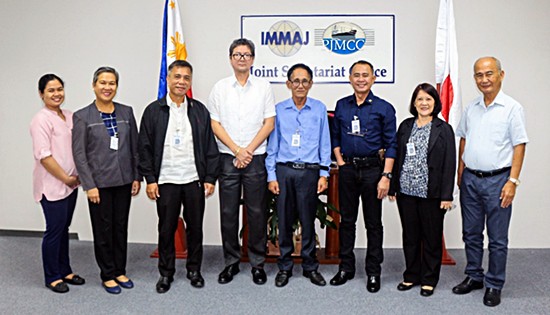
By
National Maritime
Polytechnic
October 25, 2019
TACLOBAN CITY –
Recognizing the importance of advancing the instructional skills of
maritime faculty in upgrading the qualifications of Filipino
seafarers, the National Maritime Polytechnic (NMP) and the
International Mariners Management Association of Japan -
Philippine-Japan Manning Consultative Council, Inc. (IMMAJ-PJMCC)
inked a Memorandum of Agreement (MOA) on the conduct of IMO Model
Course 6.10 (Training Course for Simulator Instructors and
Assessors) last 08 October 2019 at the 10th Floor, Ocean Breeze
Building, Coral Way Drive, Pasay City.
The agreement involves the
NMP’s opening of additional batches of IMO MC 6.10 to accommodate
IMMAJ-PJMCC scholars coming from their member-shipping / manning
companies and faculty members of member-institutions of the
Philippine Association of Maritime Institutions (PAMI). It is
expected that the participants will be able to develop instructor
traits through adoption of effective maritime simulator-based
instructions in accordance with international standards.
“The IMMAJ-PJMCC
recognizes our capability of providing a world class quality
training and this partnership affirms the multiplier effect the
training of instructors has on the overall skills education and
training endeavor in the maritime industry”, NMP Executive Director
Joel B. Maglunsod said.
The signing was led by NMP
Executive Director Maglunsod and IMMAJ-PJMCC Vice President, Capt.
Teodoro B. Quijano.
It was witnessed by Engr.
Ponciano V. Trinidad, Atty. Ruben Y. Maceda, Ms. Grace Marie T.
Ayaso, Ms. Evelyn T. Futol and Ms. Geraldine S. Paduano-Fabila of
NMP and Mr. Wenifredo G. Sola and Capt. Gerry T. Chan of IMMAJ-PJMCC.
The ultimate goal of the
collaboration is to ensure the constant availability of competent
Filipino seafarers in the world shipping market.
In CY 2018, NMP was able
to train twenty-five (25) scholars endorsed by the IMMAJ-PJMCC.
Meanwhile, NMP continues
to offer other Professional Development Courses, namely, Training
Course for Instructors (IMO Model Course 6.09) and Training Course
on the Assessment, Examination and Certification of Seafarers (IMO
Model Course 3.12). Other offerings include Deck Courses, Engine
Courses, Specialized Courses and Basic Courses.
Likewise in its sound
efforts to fulfill and realize its mandate, NMP continues to upgrade
its facilities and provide maritime trainings required pursuant to
the STCW Convention 1978 as amended including value-adding courses
towards improving the qualifications of Filipino seafarers for their
employment acceptability and enhanced competitiveness. It also
regularly conducts maritime studies to come up with policies for the
improvement of the manpower sector of the industry.
DPWH Leyte 2nd
DEO reports 71.36% completion of 2019 projects
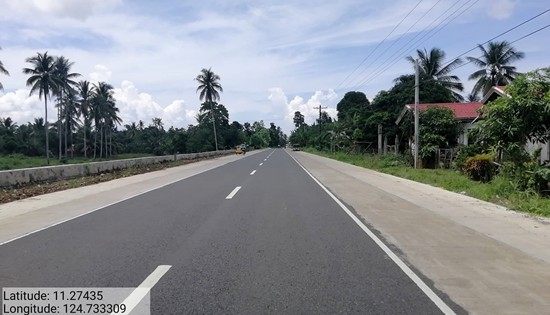
By
DPWH 2nd LED
October 25, 2019
CARIGARA, Leyte –
Infrastructure projects of the Department of Public Works and
Highways (DPWH) -Leyte Second District Engineering Office under the
“Build, Build, Build” has reached 71.36% completion as of October
21, 2019.
District Engineer Gerald
Pacanan said that out of the 88 projects under the General
Appropriations Act (GAA) of 2019, 47 are already completed, 38 are
ongoing while three have not yet started.
“We are now ahead on our
physical targets in preparation for the forthcoming FY 2020
Cash-Based Budgeting System,” he added.
On top of regular
projects, Leyte 2nd DEO also implements three school building worth
P10.8 million under the Department of Education Basic Education
Facilities Fund, and a total of nine projects amounting to P50
million worth of farm-to-market road under the Department of
Agriculture fund.
DOLE RO-8
collaborates with Biliran, 1.6M livelihood aid awarded
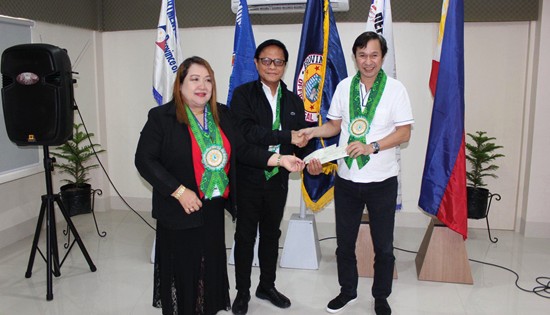
By
NORMA RAE S. COSTIMIANO
October 23, 2019
TACLOBAN CITY – To
bring the programs and services of the Department of Labor and
Employment closer to its clients and stakeholders, a collaborative
meeting, this time with the congressional district of Biliran, was
conducted by DOLE Regional Office VIII last September 30, 2019 at
A.R. Hotel in Naval, Biliran.
Regional Director Yahya A.
Centi, whom the idea of the strategic meeting came from, was very
determined to have the local chief executives and stakeholders of
the lone district of Biliran as strong partners in the
implementation of DOLE programs and services.
In his message, Director
Centi highlighted the purpose of the activity and thanked Governor
Rogelio J. Espina the officials for their positive response.
“This activity is aimed at
establishing and maintaining a strong and reliable partnership with
our LCEs, all for the welfare of our dear constituents here in
Biliran. That’s why I am overwhelmed with the response from Governor
Espina and the different municipal mayors”, said Director Centi.
The meeting was attended
by twenty two (22) officials from the Province of Biliran and
seventeen (17) from the DOLE’s side including the head of the
different member agencies of the DOLE-Regional Coordinating Council.
One of the highlights of
the one-day meeting was the release of two (2) livelihood checks
amounting to P1,675,000 for the two livelihood projects of
LGU-Kawayan namely: (1) Provision of Motorboat Engines in support to
Fishermen’s livelihood, and (2) Provision of Sewing Machines in
support to Women and Senior Citizens' livelihood.
Governor Rogelio J. Espina,
M.D., was pleasantly surprised with the provision of livelihood
assistance and expressed his gratitude to DOLE.
“Let me express my
profound thanks to DOLE for being steady in helping our
constituents. This is the kind of partnership we want here in the
province of Biliran, one with solid evidence of words transformed
into actions”, said the good governor.
Presentation of the
different programs and services of the DOLE-RCC agencies followed
which was capped with an open forum.
Long overdue K-12
review must evaluate its attainment of education objectives
By
ACT Philippines
October 23, 2019
QUEZON CITY – The
Congress and the Department of Education’s (DepEd) recent push to
review the K to 12 program is five years late. The education agency
is directed by the Implementing Rules and Regulation of the Enhanced
Basic Education Act of 2013 to conduct a mandatory evaluation review
of the program by the end of school year 2014-2015. The Joint
Congressional Oversight Committee, on the other hand, is mandated to
oversee, monitor, and evaluate the implementation of the K-12
program.
While long overdue, the
Alliance of Concerned Teachers (ACT) Philippines expects that the
DepEd and Congress will conduct an honest-to-goodness review that
would expose the failures of the program in improving the access to
and the quality of basic education in the country. Teachers,
parents, and students suffer everyday the catastrophic experiment
that is the K to 12 program as it has only managed to worsen the
crises in the Philippine educational system.
The addition of two years
in basic education has only resulted to worse shortages in the
educational system given the government’s consistent tack to scrimp
on the education budget. Deficiency in classrooms now number to more
than 100,000, which is the main culprit to ballooning class size and
the adoption of class shifts in schools with big enrollments.
DepEd’s request for 40,000 new teaching items for 2020 reflects the
grave shortage in the number of teachers. Worse is the inadequacy in
the number of education support personnel in schools that force
teachers to take on non-teaching duties.
Six years after, K-12
textbooks for a number of subjects and grade levels remain absent.
Farther from reach is DepEd’s illusion of attaining 21st century
education through the extensive utilization of technology in
pedagogy and learning. These glaring shortages, coupled with DepEd’s
pressure on teachers to deliver on the demands of the K-12 program
have rendered the underpaid mentors more cash-strapped and
overworked.
Privatization of basic
education worsened as the government depended primarily on private
schools to provide senior high school education. Instead of
investing on the construction of public senior high schools, the
government has expended heavily on the E-GASTPE program to send
senior high school students to private schools under vouchers. As
vouchers do not cover the whole cost of private school education,
more and more seek to transfer to the limited number of SHS, while
others are forced to become highschool dropouts.
The bid to produce
‘holistically developed Filipino learners with 21st century skills’
and ‘employment-ready high school graduates’ have caused the heavy
experimentation of the curriculum. The purported ‘integrated,
spiral, and outcomes-based’ design of the curriculum have actually
resulted in a basic education curriculum that is rather muddled and
fragmented. Teachers can attest to the growing number of non-readers
among learners who are promoted to highschool. The results of the
National Achievement Test or NAT can speak as well on the declining
quality of education. Teachers are always blamed for this problem
when it only reflects what and how the education agency has made
them teach.
Misgivings on the
effectiveness of K-12 program center on its failure to produce
‘employment-ready’ graduates. While the program obviously fell short
of this avowed objective, it would be more meaningful to assess the
program vis-a-vis the attainment of education objectives as set by
the Constitution. The 1987 Philippine Constitution sets the ultimate
objectives of education as “fostering nationalism and patriotism,
accelerating social progress, and promoting total human liberation.”
K-12 program’s push to produce an army of employable cheap and
skilled labor that satisfies the demand of the global market
sidelines the important role of education in nation-building and
national development.
The study of Philippine
History and social science was the first casualty in the K-12
curriculum restructuring. Study hours for Araling Panlipunan were
shorter than those of other major subjects wile Philippine History
was stricken off the junior high school curriculum and was
downgraded to elementary level, split between Grades 5 and 6. The
study of Mathematics and Natural Science, which is crucial in the
development of analytical, scientific, and critical thinking, was
rearranged in a manner that has fragmented the study of knowledge
development. Outcomes-based approach translated to output-centric
student evaluation that rely-heavily on submitted works, as how
laborers are pressed to produce commodities.
Changes in the basic
education curriculum equally hit tertiary education. Filipino
language and Philippine Literature subjects were removed from the
list of required subjects in tertiary education. Study of humanities
and social sciences in college general education was weakened as the
drive towards specialization and development of technical skills
intensifies.
To be truly meaningful for
the Filipino people and our aspiration for national development, the
K to 12 review must question the program to its core. Has it served
to foster nationalism and patriotism, accelerate social progress,
and promote total human liberation?
DPWH builds
classrooms for elementary schools in Leyte
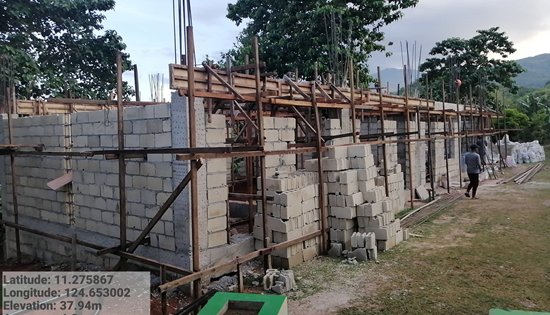
By
DPWH-Biliran
October 22, 2019
CAPOOCAN, Leyte –
Three elementary schools will benefit school building projects in
Leyte towns, the Department of Public Works and Highways (DPWH)
Leyte Second District Engineering Office reported.
District Engineer Gerald
Pacanan said that the Department of Education (DepEd) -Basic
Education Facilities Fund (BEFF) has alloted P10.8 million for the
construction of one-unit one-storey two-classroom school building
project each in Gen. Luna Elementary School in Mac Arthur, Leyte;
Calutan Elementary School in Dagami, Leyte and Manloy Elementary
School in Capoocan, Leyte.
Pacanan added that the
office is fast tracking the implementation of these projects to
accommodate the increasing number of pupils by school opening of
2020.
The engineering office
guarantees that contractors will adhere to the standard design of
the department for the safety of the pupils and teachers.
The school building
projects are funded under the Department of Education (DepEd) -Basic
Education Facilities Fund (BEFF), an annual budget for the school
building program that covers the construction, site inspection, and
the improvement and maintenance of school facilities.
|
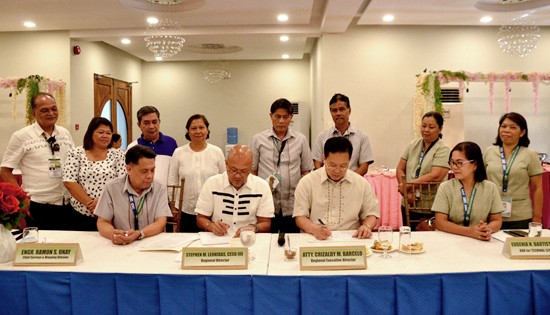
Regional
Director Stephen Leonidas (seated, 2nd from left) of the
Department of Agrarian Reform (DAR), and Regional Executive
Director Atty. Crizaldy Barcelo (seated, 2nd from right) of
the Department of Environment and Natural Resources (DENR)
formally sign the agreement that would hasten approval of
survey returns to fast track processing of land valuation by
the Land Bank of the Philippines of lands covered under the
Comprehensive Agrarian Reform Program (CARP). |
DAR enters
agreement with DENR
By
JOSE ALSMITH L. SORIA
October 21, 2019
TACLOBAN CITY –
Barely a month in office, Regional Director Stephen Leonidas of the
Department of Agrarian Reform (DAR) entered another agreement, this
time with the Department of Environment and Natural Resources (DENR)
for the smooth approval by the latter of survey returns to fast
track processing of land valuation by the Land Bank of the
Philippines -Agrarian Operation Center (LBP-AOC) of lands covered
under the Comprehensive Agrarian Reform Program (CARP).
DAR Regional Director
Stephen Leonidas and DENR Regional Executive Director Atty. Crizaldy
Barcelo formally signed the agreement recently at Hotel Costa Brava,
in support to the agreement DAR previously entered with LBP-AOC.
Barcelo, during the said
occasion, expressed his office’s full support to the agreement
between DAR and LBP-AOC specifically in the issuance of the needed
survey returns.
Leonidas, on the other
hand, thanked Barcelo and the entire DENR workforce for the
cooperation and support of the said agency, which according to him
is for the benefit of the agrarian reform beneficiaries.
In the agreement between
the DAR and the LBP-AOC, the latter will accept only approved survey
plan in requests for the conduct of joint field inspection leading
to the issuance of Memorandum of Valuation (MOV) and/or Certificate
of Deposit (COD).
To comply this
requirement, DAR and DENR discussed on September 20 how to hasten
the approval of survey returns, and on the 30th of the same month,
the agreement was formally sealed by affixing the signatures of the
heads of the two offices as well as witnesses which include
Provincial Agrarian Reform Program Officers (PARPOs) Gilberto
Apilado of Eastern Samar, Renato Badilla of Leyte, Nida Abelido of
Northern Samar, Elisea Orapa of Southern Leyte, DENR’s Assistant
Regional Director for Technical Services, Dr. Eugenia Bautista;
Chief of the Surveys and Mapping Division, Engr. Ramon Unay; Head of
the Survey Verification Unit, Engr. Allan Vicentillo; Chief of the
Original and Other Survey Section, Engr. Evelyn Amago; and Chief of
the Land Records Section, Engr. Nila Castañares.
Among the agreements in
the said document states that requests for approval of survey
returns with complete attached documents should be acted upon by the
verifier within a period of 15 days from receipt and immediately be
submitted to the office of the Chief of Surveys and Mapping Division
for recommendation, and subsequently to the Office of the Assistant
Regional Director for Technical Services for the approval.
For those with pending
patent application, DAR should secure first withdrawal of the said
application at the Community and Natural Resources Office (CENRO).
Meanwhile, to ensure
correct classification of lands during the preliminary projection of
landholdings, DAR shall apply the Geo Referencing approach using the
digital copy of land classification map provided by DENR.
In case of discrepancies
of areas reflected in the land titles and the approved survey plans,
DAR shall secure first imprimatur from the Register of Deeds (ROD)
annotating the correct area based on record stipulated in RP
(Republic of the Philippines) titles.
Further, for survey
returns with “double survey”, DAR shall file first request for
cancellation of the approved survey plan before submitting the new
survey returns.
Furthermore, ROD
certification stating that no title has been issued yet, is no
longer mandatory for those with “double survey”. Instead, a
certified copy of the latest title and CENRO certification as to the
status of the landholding subject of second survey will be required.
It was also agreed that
CENRO certification shall be released within a period of 15 calendar
days from the receipt of the request.
Considering these
agreements DAR entered recently with the two line agencies, Leonidas
is anticipating CARP’s land acquisition and distribution activities
in Eastern Visayas will accelerate and eventually meet the 2022
deadline set by the President, when the latter’s term of office
ends.